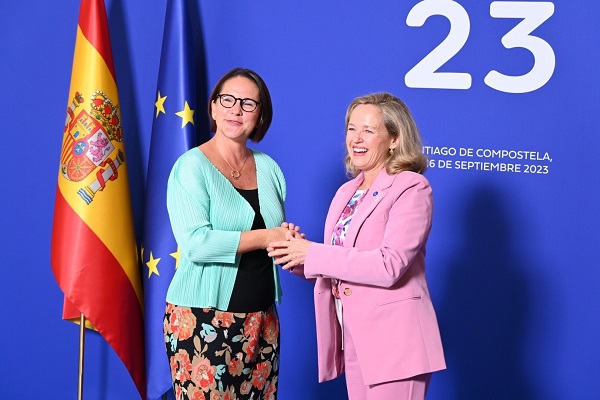 (L-R) Yuriko Backes, Luxembourg’s Minister of Finance, and Nadia Calvino, First Deputy Prime Minister of Spain and Minister for Economy and Digitalisation;
Credit: MinFin
(L-R) Yuriko Backes, Luxembourg’s Minister of Finance, and Nadia Calvino, First Deputy Prime Minister of Spain and Minister for Economy and Digitalisation;
Credit: MinFin
Luxembourg’s Minister of Finance, Yuriko Backes, travelled to Santiago de Compostela on Friday 15 and Saturday 16 September 2023, to participate in Eurogroup meetings and in the informal Economic and Financial Affairs Council (ECOFIN) meetings, organised under the EU Council’s Spanish Presidency.
According to Luxembourg’s Ministry of Finance, the European Commission's summer economic forecasts were at the centre of the Eurogroup's agenda. In this context, the ministers discussed recent economic and monetary developments as well as their impact on public finances.
Minister Backes shared her observations: “The heterogeneous developments within the Eurozone - which, while showing signs of slowing, remains resilient - illustrate the need to closely monitor developments in the respective economies and the importance of our coordination efforts within the Eurogroup. While remaining optimistic, we must adopt a realistic and cautious approach, taking into account medium- and long-term risks, including the climate challenges raised during our discussions. In this context, we must in particular continue to address the challenges posed by energy prices and the role they play for public finances, competitiveness and the green transition.”
At ECOFIN, the first working session entitled “Interaction of Fiscal and Monetary Policy” explored how to reconcile short-term policy objectives such as inflation control, sustained growth and robust performance of the labour market, with the definition of a monetary policy mix to achieve common political priorities.
The ministers also exchanged views on the ongoing discussions on legislative proposals aimed at reforming the European Economic Governance Review (EGR) and discussed the succession of Werner Hoyer to the presidency of the European Investment Bank.
A second working session, under the theme “Strategic Autonomy, Economic Security and Public Goods of the EU”, offered ministers the opportunity to discuss the future perspective of the European project in the face of a constantly evolving international landscape, marked by the emergence of new players in the economic, commercial and financial fields, major upheavals in the geopolitical balance and a series of significant shocks accompanied by technological innovations.
Minister Backes commented: “In a geopolitical context marked by increased fragmentation, the EU must not neglect its resilience. But protectionism or an aggressive relocation policy are not solutions. The EU must continue to commit to multilateralism and open markets and develop its relationships with trusted partners. […] A smarter approach to regulation, with systematic attention to limiting administrative burdens, would be essential to ensure efficient use of available resources and unlock growth.”
Finally, a joint meeting with ministers and international financial institutions from Latin America and the Caribbean region took place for the first time, organised in collaboration with CAF - Development Bank of Latin America and the Caribbean. These meetings were held under the theme: “Towards a global green and digital economy".








